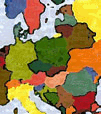Radko inaugural meeting
A promotional meeting of the pro-Bulgarian society Radko, held at the Holiday Inn in Skopje this week, sparked a great deal of controversy following an incident in which three men threw smoke bombs into the meeting-hall. Approximately 70 participants rushed towards an exit, where a further smoke bomb exploded, adding to the confusion. Two of the bombers were caught by security guards and beaten severely, and journalist Spase Šuplinovski was beaten by supporters of the society.
The incident comes at a point of close relations between the Macedonian and Bulgarian governments, fuelling media rumours of Bulgarian expansionist aims. The president of the society, Vladimir Paunkovski began his speech in a mixed Macedonian and Bulgarian language, and stressed the historic links between Slavs living within Macedonia and Bulgarians, stating that "Macedonians" through the centuries have always claimed Bulgarian descent.
He accused Slavs within Macedonia who deny this of subscribing to a Serb, Communist agenda of suppressing Bulgarian identity in the region. Paunkovski announces that the society will attain its goal of freedom from this oppressive "Serbian" ideology by publishing books, newspapers, through electronic media and by opening libraries.
The meeting was attended by the Bulgarian ambassador to Macedonia, Angel Dimitrov. Later in the week he was summoned before the Macedonian Ministry of Home Affairs to explain his attendance, amidst accusations that the act was not within the framework of usual diplomatic activity and could be construed as participating in attempts to deny the identity of the country which has "offered him hospitality."
Kosovo election results
Arben Xhaferi, the leader of PDSh (the largest ethnic Albanian party in Macedonia), said the victory of moderate ethnic Albanian leader Ibrahim Rugova in the Kosovo elections would help normalise the Balkans. Xhaferi, whose party is a part of Macedonia's governing coalition, said Rugova's victory did not surprise him, as "people in Kosovo were voting mostly for political icons rather than mayors and Rugova fitted that image best," he said, adding that Rugova is seen as a seasoned negotiator able to negotiate the province's future.
Accession of Yugoslavia to the UN
Macedonia welcomed the accession of Federal Republic of Yugoslavia into the United Nations (UN), saying that it hopes that the new authorities in Belgrade will honour obligations set out in the UN Charter and resolve open issues with neighbouring countries. Macedonian Foreign Minister Aleksander Dimitrov this week stressed that the integration of Yugoslavia into the UN has profound significance for neighbouring states; most notably for Macedonia, the issues of border demarcation and state-succession.
"Yugoslavia, as a new member of the UN, undertook to meet international obligations. Such commitment will result in the due settlement of issues linked to border demarcation between the Republic of Macedonia and the Federal Republic of Yugoslavia, as well as the succession issue linked to the four republics that declared independence and left the Former Yugoslav Federation."
UN adopts Macedonian resolution
This week, the First Committee of the UN General Assembly adopted the "Macedonian Resolution" designed to assure international security, co-operation, stability and development within Southeast Europe. MTV reported that the Resolution was backed by 40 UN member states, including all EU member states. It commits all the countries to observing principles of territorial integrity and sovereignty and to renounce any threats to international peace and security that could lead towards conflicts and disintegration of the countries.
Domestic political problems
Friction has arisen within the governing coalition, as Vasil Turpurkovski of the Democratic Alternative (DA) announced this week that he intends to look for new partners to help him realise his political platform as he is dissatisfied with the progress of the VMRO-DPMNE led government. He has emphasised that the new partners may be drawn from opposition as well governing parties.
The flipside of this are rumours that Ljubčo Georgievski is looking for a replacement for the DA in the government coalition; and current speculation suggests that the governing coalition will be joined by six to eight MPs from PDP (the Albanian party currently in opposition), two independent MPs and one MP from DAAM.
And in other news...
- Slovenia's largest bank, Nova Ljubljanska Banka (NLB), bought a 25 per cent stake in Macedonia's Tutunska Banka Skopje on the Macedonian stock exchange on Tuesday. "Our bank sold 25 per cent of its shares to Nova Ljubljanska Banka for USD 2685 million at today's trading session at the bourse," a senior Tutunska Bank official said.
- Macedonia's Ecology Minister Toni Popovski asked the Cabinet to reverse its decision to allow drought-stricken neighbouring Albania to use the waters of the Ohrid Lake, because the plan would endanger the lake's ecological balance and exacerbate already sinking water levels.
- The defence ministers of Macedonia and Taiwan signed a memorandum of military co-operation in Taipei on Monday.
- Macedonia's government decided to raise fuel prices by an average of 3.6 per cent, depending on the fuel type.
- Macedonia's state electricity company said it did not expect power supply problems during the coming winter.
- Interior Minister of Ukraine Jurij Kravchenko visited his Macedonian counterpart, Dosta Dimovska, this week and signed a document supplementing the current agreement on co-operation between Macedonian and Ukrainian Interior Ministries. They agreed to step up the co-operation in the fight against organised crime.
Eleanor Pritchard, 3 November 2000
Moving on:
- Archive of Macedonian news reviews
- Browse through the CER eBookstore for electronic books
- Buy English-language books on Central Europe through CER
- Return to CER front page
Sources:
Start, weekly magazine
Forum, fortnightly magazine
Dnevnik, daily
Vecer, daily
A1 TV




